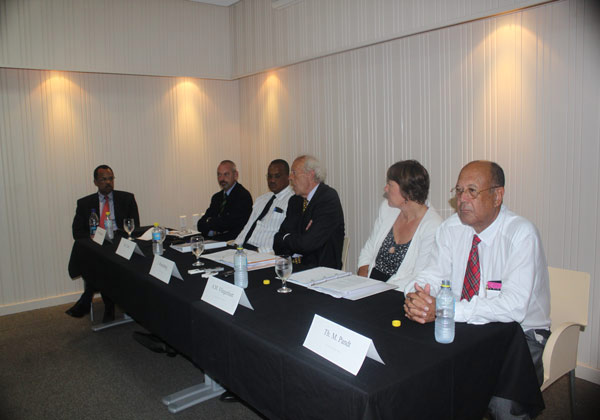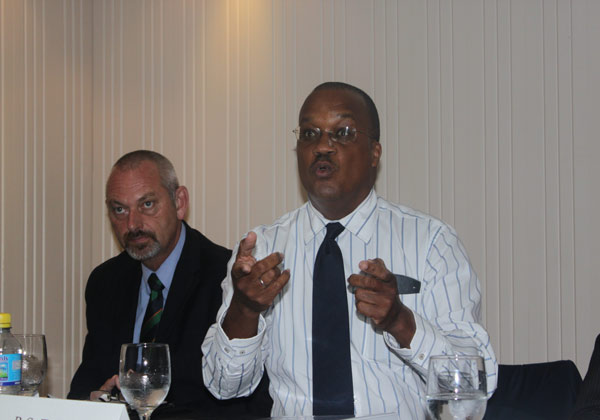 Philipsburg:--- Members of the College Financieel Toezicht (CFT ) are doubtful that St. Maarten's executive council would get the green light and approval from the Central government to implement the extra one percent turns over tax by June 1. For this to happen the central government would have to amend the law and most importantly St. Maarten has to have an agreement with the other islands to allow them to increase turn over tax on St. Maarten only. While members of the CFT are not questioning St Maarten on its ability to get this done within the next two weeks they would be monitoring the situation to make sure it is feasible. Currently the tax compliance on St. Maarten is between 30 to 35% said the CFT. Max Pandt said based on administration information in Curacao, St. Maarten has a tax compliance of 30% which to him is rather low.
Philipsburg:--- Members of the College Financieel Toezicht (CFT ) are doubtful that St. Maarten's executive council would get the green light and approval from the Central government to implement the extra one percent turns over tax by June 1. For this to happen the central government would have to amend the law and most importantly St. Maarten has to have an agreement with the other islands to allow them to increase turn over tax on St. Maarten only. While members of the CFT are not questioning St Maarten on its ability to get this done within the next two weeks they would be monitoring the situation to make sure it is feasible. Currently the tax compliance on St. Maarten is between 30 to 35% said the CFT. Max Pandt said based on administration information in Curacao, St. Maarten has a tax compliance of 30% which to him is rather low.The CFT feels that with the suggestions they provided to the executive council St. Maarten would be able to yield more tax income in the years ahead. They said one of the requests they made to the executive council on Wednesday were for the island government to work harder on the suggestions made to them on tax revenues and to allow the CFT to closely monitor the island's financial development. They also agreed that the island council of St. Maarten should be aware of the new and additional conditions implemented on St. Maarten by the CFT.
They said the executive council has agreed to inform the CFT on a monthly basis the actual financial development so that they can determine at an early stage if there is going to be a crisis.
At a press conference on Wednesday CFT said that even though they are optimistic of the approach they are still willing to give the island government of St. Maarten the benefit of the doubt. Chairman of the CFT A.M Vliegenhart said the executive council could have chosen to implement other measures to increase revenues on St. Maarten rather than to increase the turn over tax. The chairman said St. Maarten has the lowest taxation compared to the other Caribbean islands and taxes could have been added elsewhere.
However, he made clear that the decision has to come from the island government of St. Maarten and not the CFT. The chairman said at this point in time there is no need for them to report to the Royal Dutch Government a negative report on the budget since they are still in discussions to balance the budget based on higher supervision laws, while making clear that they did not rule out that possibility neither given up that right.
The chairman said the moment they get indications that things are not going as stipulated in the budget then they would have to begin discussing other measures which would bring about a balance budget. One of the requests of the CFT is to make sure there is more tax compliance on St. Maarten since the taxes here are much lower that the other Caribbean islands, and they felt there is still room for St. Maarten to get more income tax. Should the island government explore these possibilities then they would definitely be able to reduce the other tax rates. However, these decisions have to be taken by the local politicians.
The chairman of the CFT said during their discussion with the island council members of the opposition expressed doubt about St. Maarten being able to increase the turn over tax by June 1. He said the opposition did not believe in the increase of the turn over tax and they made some other suggestions to the executive council.
The opposition believes that the executive council should look into getting the Dutch Antilles to transfer additional income to St. Maarten. The CFT feels that is a solution that could be considered by the island government and not the CFT.
They said that the federal tax receivers had given the executive council wrong figures when it comes to income tax. That they said had to be adjusted by 23 million guilders. Currently the budget lacks about 27 million guilders before it can be balanced and government has decided to make cuts of about 13.5 million guilders while they believe if they increase the turn over tax from 3% to 4% percent they would yield another 13.5 million guilders within a six month period which would balance the budget. Considering the economic down trend it is not possible to say if government would be able to collect that amount of monies. Roland Tuitt and Max Pandt of the CFT committee admitted that the current finance commissioner Xavier Blackman has inherited a lot of set backs when he took office. Tuitt said Blackman did submit a realistic budget in the beginning. He said anyone who is dealing with the current process would do exactly what Blackman did by adding the monies the island was expecting with the transfer of the federal government to St. Maarten, but said the budget was submitted too late. Tuitt said when the budget was submitted the CFT had already approved the Curacao and the Federal Government budget. "Had St. Maarten submitted that budget in June last year then it would have been approved by the CFT." Tuitt said. Tuitt said St. Maarten did not get the opportunity to have a transition period and the figures they are presenting were not verified. He said when the CFT requested St. Maarten to remove the departments from the federal government from the budget then they ended up with a huge deficit which is not acceptable to the higher supervision laws. He said at that point the budget had a deficit of 25 million which is difficult for any government to fill.
Roland Tuitt and Max Pandt of the CFT committee admitted that the current finance commissioner Xavier Blackman has inherited a lot of set backs when he took office. Tuitt said Blackman did submit a realistic budget in the beginning. He said anyone who is dealing with the current process would do exactly what Blackman did by adding the monies the island was expecting with the transfer of the federal government to St. Maarten, but said the budget was submitted too late. Tuitt said when the budget was submitted the CFT had already approved the Curacao and the Federal Government budget. "Had St. Maarten submitted that budget in June last year then it would have been approved by the CFT." Tuitt said. Tuitt said St. Maarten did not get the opportunity to have a transition period and the figures they are presenting were not verified. He said when the CFT requested St. Maarten to remove the departments from the federal government from the budget then they ended up with a huge deficit which is not acceptable to the higher supervision laws. He said at that point the budget had a deficit of 25 million which is difficult for any government to fill.
While the island government is still looking for solutions to rectify and balance the 2010 budget they are supposed to present the 2011 budget to the CFT by August 15 and May 1 to the Island Council based on the rules of order.









